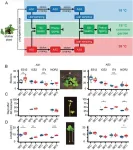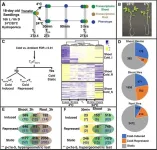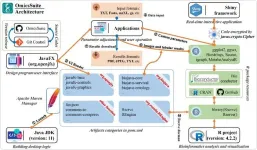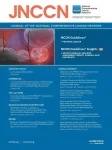(Press-News.org) Huntington’s Disease is the most common neurodegenerative disorder controlled by a single gene and is characterized by motor and cognitive deficits and psychiatric symptoms. Currently, no treatments can stop or reverse the disease, but new research from Boston Children’s Hospital suggests that there might be a way to protect the brain and prevent or slow cognitive decline.
Research from the lab of Beth Stevens, PhD suggests that parts of the immune system – complement proteins and microglia – mediate the loss of specific synapses connecting the brain’s cortex and striatum. The findings, recently published in Nature Medicine, could also shed light on other neurodegenerative conditions like Alzheimer’s Disease.
In 2012, the Stevens lab was one of the first to show that microglia engulf and prune synapses during normal brain development, fine-tuning the brain’s connections. The lab also showed that complement proteins tag synapses meant for elimination. Stevens and her team speculated that in diseases involving synapse loss, like Alzheimer’s Disease, schizophrenia, and Huntington’s Disease, this pruning process is abnormally reactivated.
Huntington’s Disease offered an ideal opportunity to test their theory, both because there is a single gene associated with the condition and because it has a very well-defined pathology with specific brain regions and even select synaptic connections between neurons being impacted at early stages of the disease.
Using an animal model and postmortem brain samples from patients with Huntington’s disease, Stevens and colleagues showed that complement proteins and microglia are activated very early in the illness — before cognitive and motor symptoms emerge — and that they target a specific vulnerable brain circuit in the pathway connecting the cortex and striatum. Corticostriatal circuits are known to be involved in movement and learning what actions lead to positive outcomes or “reward.” The researchers saw increased levels of complement proteins, specifically around these synapses in the striatum. At the same time, inputs from neurons in other brain regions that connect to the same cells were relatively spared.
When the team blocked the complement protein C1q in their animal model — either with an antibody or by genetically deleting the complement receptor CR3 on microglia — they prevented synapse loss. They also prevented cognitive defects around visual discrimination learning and cognitive flexibility. “Some cognitive deficits tend to develop much earlier than motor defects in Huntington’s disease, and this occurs in humans, too,” notes Dan Wilton, PhD, first author of the study. “The Huntington’s Disease model we are studying does develop some slight motor defects that are also resolved with complement blocking strategies.”
Wilton and colleagues showed a mechanism of specificity, selective vulnerability, and what happens at the earliest stages of Huntington’s Disease. The findings also suggest a possible biomarker: levels of innate immune molecules were elevated in the cerebrospinal fluid (CSF) of patients with Huntington’s disease, even before the appearance of motor symptoms correlating with a known predictor of pathological severity and disease onset. “We’re excited by the idea that we could identify neuroimmune biomarkers to stratify people at the earliest stage and prioritize some for treatment,” says Stevens, a member of the F.M. Kirby Neurobiology Center at Boston Children’s and affiliate with the Broad Institute and Howard Hughes Medical Institute. “If you had clinical samples such as CSF, measuring these biomarkers could bring insight into what is happening in the brain.”
Stevens thinks similar mechanisms and biomarkers may apply to other neurodegenerative disorders, such as Alzheimer’s and frontotemporal dementia, which her lab is also exploring.
But most immediately, Stevens’ team hopes to unravel how the huntingtin mutation leads to complement activation. They know that specific expression of mutant huntingtin in both cortical and striatal neurons is required to initiate the synaptic elimination mechanism. Still, the factors leading to the selective targeting of corticostriatal inputs remain to be determined.
“Huntington’s is a nice model to tease this out,” says Stevens. “That’s a major future direction for our group.
About Boston Children’s Hospital
Boston Children’s Hospital is ranked among the best children’s hospitals in the nation in the nation by U.S. News & World Report and is a pediatric teaching affiliate of Harvard Medical School. Home to the world’s largest research enterprise based at a pediatric medical center, its discoveries have benefited both children and adults since 1869. Today, 3,000 researchers and scientific staff, including 11 members of the National Academy of Sciences, 28 members of the National Academy of Medicine and 9 Howard Hughes Medical Investigators comprise Boston Children’s research community. Founded as a 20-bed hospital for children, Boston Children’s is now a 485-bed comprehensive center for pediatric and adolescent health care. For more, visit our Answers blog and follow us on social media @BostonChildrens, @BCH_Innovation, Facebook and YouTube
END
A step towards understanding early interventions for Huntington’s Disease
Research from Boston Children’s Hospital suggests that there might be a way to protect the brain and prevent or slow cognitive decline.
2023-10-13
ELSE PRESS RELEASES FROM THIS DATE:
Landmark publication calls for increased attention to workplace mental health
2023-10-13
A landmark scientific article on the workplace as a major determinant of health is published today (Thursday, 12 October) in The Lancet, and reveals a global picture of the work-related causes of mental health conditions.
Carried by University College Cork (UCC) researchers for the Lancet Series on work and health, the paper illustrates that major progress in population health can be made by an increased focus on improving people’s work environments.
The paper, ‘Work-related causes of mental health conditions and interventions for their improvement in workplaces’, ...
DNA methylation: The hidden mechanism enabling plants to adapt in a warmer world
2023-10-13
As global warming continues to redefine ecosystems, plants are increasingly tasked with swift adaptation to ensure their survival. One primary mechanism facilitating such rapid adaptation is epigenetic memory, specifically DNA methylation. DNA methylation, a form of epigenetic modification, involves the addition of a methyl group to the cytosine bases of the DNA, altering its accessibility in chromatin and modulating gene expression. In the context of a warming climate, changes in DNA methylation can be triggered by environmental factors like increased temperature. Such epigenetic adaptations ...
Unlocking the secrets of cold tolerance: a deep dive into tomato plants' molecular responses to chilling stress
2023-10-13
Cold sensitivity poses a significant challenge for certain essential crops. While there's an indication that these plants may possess cold acclimation capabilities, the molecular dynamics, particularly involving the CRT binding factor (CBF) family, are not fully explored. One primary concern has been the disparity in cold tolerance between temperate plants and tropical species such as the tomato. Additionally, the accumulation of small metabolites, termed cryoprotectants, plays a crucial role in enabling plants to resist damage from low temperatures. Adding ...
OmicsSuite: A customized and pipelined suite for analysis and visualization of multi-omics big data
2023-10-13
Abstract:
With the advancements in high-throughput sequencing technologies such as Illumina, PacBio, and 10X Genomics platforms, and gas/liquid chromatography-mass spectrometry, large volumes of biological data in multiple formats can now be obtained through multi-omics analysis. Bioinformatics is constantly evolving and seeking breakthroughs to solve multi-omics problems, however it is challenging for most experimental biologists to analyze data using command-line interfaces, coding, and scripting. Based on experience with multi-omics, we have developed OmicsSuite, a desktop suite that comprehensively integrates statistics and multi-omics analysis and visualization. The suite ...
Stress wrecks male big brown bat fertility during breeding season
2023-10-13
Even on a good day the environment can be wildly unpredictable, from unexpected gusts of wind to food scarcity, and as humans continue to edge out the natural world, the stress on wild populations is increasing. ‘Bats are critical for the maintenance and stability of many terrestrial ecosystems’, say Mattina Alonge [University of California, Berkeley (UCB), USA] and Lucas Greville (McMaster University, Canada) and the animals are known to be particularly sensitive when under strain. But little was known about the impact that stress might have on their ability to reproduce. Concerned about the effect of stress on already vulnerable bat populations, Alonge and her colleagues ...
Almost half of patients with skin disease suffer from sleep disturbances, global study finds
2023-10-13
(Friday, 13 October 2023, Berlin, Germany) Almost half (42%) of patients with skin disease experience sleep disturbances, a major study presented today at the European Academy of Dermatology and Venereology (EADV) Congress 2023 has revealed.1
The ALL PROJECT, a comprehensive international research initiative, analysed over 50,000 adults across 20 countries to assess the impact of skin diseases.2
Notably, these sleep disturbances were found to have broader implications on patients' quality of life. Nearly half (49%) of patients with skin disease reported reduced productivity at work, in contrast with just one in five (19%) participants without a skin disease.1
The ...
Kraft Family Blood Donor Center expands eligibility for donors
2023-10-12
Boston – The Kraft Family Blood Donor Center, which provides lifesaving blood products to patients at Dana-Farber Cancer Institute and Brigham and Women’s Hospital, announced today that it has finished implementing a more inclusive blood donation process, in alignment with updated guidelines issued by the U.S. Food and Drug Administration (FDA) that will allow many gay and bisexual men to donate blood and platelets.
On May 11, 2023, the FDA changed its policy to reflect that deferring prospective blood donors based on sexual orientation is no longer supported by data. ...
200-year-old DNA helps map tiny fly’s genetic course to new lands, modern times
2023-10-12
Back when the biggest fly enthusiasts of 19th century Sweden — Carl Fredrik Fallén, for one, and later Johan Wilhelm Zetterstedt — were collecting insects for what would become Lund University’s entomological collections, they wondered exactly what was that buzzing coming from their can of raisins.
Skip forward 200 years, and the humble fruit fly, known better to geneticists as Drosophila melanogaster, is one of the most thoroughly studied animals on the planet. And DNA from Fallén and Zetterstedt’s centuries-old curiosities are still revealing new insights into the fly’s evolution as it spread alongside ...
Study highlights concerns and preferences of residents regarding police involvement in mental health crisis response
2023-10-12
PHILADELPHIA (October 11, 2023) – Police officers often respond to incidents that do not involve crime or immediate threats to public safety but instead deal with community members facing unmet mental health needs. In response to this, many cities are experimenting with co-deploying police officers alongside health professionals or deploying teams entirely composed of civilian health professionals.
Recently, researchers from the University of Pennsylvania School of Nursing (Penn Nursing) explored the perspectives and preferences about these programs among residents in structurally disadvantaged areas where mental health distress is ...
More Aggressive treatment doesn’t impact quality of life for metastatic colorectal cancer patients, according to new study in JNCCN
2023-10-12
PLYMOUTH MEETING, PA [October 12, 2023] — New research in the October 2023 issue of JNCCN—Journal of the National Comprehensive Cancer Network finds that intensive local-regional treatment to remove as much tumor as possible (known as “debulking”), in addition to standard systemic therapy, does not impact overall quality of life significantly for people with metastatic colorectal cancer.
The researchers examined the ongoing ORCHESTRA trial (NCT01792934) to compare patients treated with standard palliative chemotherapy alone to those who received palliative chemotherapy plus either surgery, ablative therapy, and/or radiotherapy ...
LAST 30 PRESS RELEASES:
Novel camel antimicrobial peptides show promise against drug-resistant bacteria
Scientists discover why we know when to stop scratching an itch
A hidden reason inner ear cells die – and what it means for preventing hearing loss
Researchers discover how tuberculosis bacteria use a “stealth” mechanism to evade the immune system
New microscopy technique lets scientists see cells in unprecedented detail and color
Sometimes less is more: Scientists rethink how to pack medicine into tiny delivery capsules
Scientists build low-cost microscope to study living cells in zero gravity
The Biophysical Journal names Denis V. Titov the 2025 Paper of the Year-Early Career Investigator awardee
Scientists show how your body senses cold—and why menthol feels cool
Scientists deliver new molecule for getting DNA into cells
Study reveals insights about brain regions linked to OCD, informing potential treatments
Does ocean saltiness influence El Niño?
2026 Young Investigators: ONR celebrates new talent tackling warfighter challenges
Genetics help explain who gets the ‘telltale tingle’ from music, art and literature
Many Americans misunderstand medical aid in dying laws
Researchers publish landmark infectious disease study in ‘Science’
New NSF award supports innovative role-playing game approach to strengthening research security in academia
Kumar named to ACMA Emerging Leaders Program for 2026
AI language models could transform aquatic environmental risk assessment
New isotope tools reveal hidden pathways reshaping the global nitrogen cycle
Study reveals how antibiotic structure controls removal from water using biochar
Why chronic pain lasts longer in women: Immune cells offer clues
Toxic exposure creates epigenetic disease risk over 20 generations
More time spent on social media linked to steroid use intentions among boys and men
New study suggests a “kick it while it’s down” approach to cancer treatment could improve cure rates
Milken Institute, Ann Theodore Foundation launch new grant to support clinical trial for potential sarcoidosis treatment
New strategies boost effectiveness of CAR-NK therapy against cancer
Study: Adolescent cannabis use linked to doubling risk of psychotic and bipolar disorders
Invisible harms: drug-related deaths spike after hurricanes and tropical storms
Adolescent cannabis use and risk of psychotic, bipolar, depressive, and anxiety disorders
[Press-News.org] A step towards understanding early interventions for Huntington’s DiseaseResearch from Boston Children’s Hospital suggests that there might be a way to protect the brain and prevent or slow cognitive decline.







